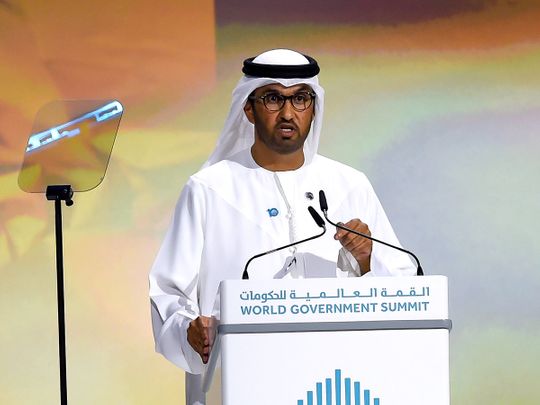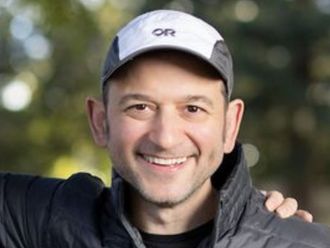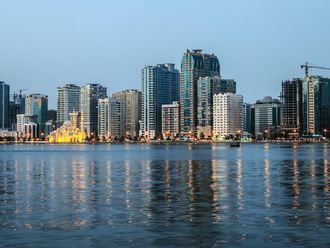
Dubai: The world needs a major course correction in its fight against climate change, said Sultan Al Jaber, the UAE Minister of Industry and Advanced Technology, on Tuesday.
Al Jaber said: “The current approaches we have been using come from a different era no longer fit for purpose. The hard reality is that global emissions must fall by 43 per cent by 2030, and that’s only seven years away.”
The UAE Special Envoy for Climate Change and the UAE COP28 President-Designate gave an impassioned speech at the World Government Summit and urged world leaders and delegates to prioritise the investment of time and resources and transition countries’ energy requirements to renewable sources.
more from world government summit
- Turkey will never forget the friendship extended by UAE: Erdogan
- UN chief calls for faster government action to address “confluence of crises”
- World Government Summit 2023: UAE’s support vital in Turkey-Syria earthquake relief, says WHO chief
- WGS 2023: Arab League, GCC chiefs outline priorities for coming phase
“The international community must follow through on pledges made over a decade ago,” said Al Jaber. “We need a real reform of international financial institutions and multi-lateral banks to unleash more concessional dollars, lower risk and attract more private finance for vulnerable communities.”
The UAE will host the COP28 conference later this year. The event will also see the culmination of the first global stocktake of the 2015 Paris Agreement, a legally binding international treaty on climate change.
The stocktake is a two-year process where information and data on the implementation of the Paris Agreement are evaluated.
The stocktake will analyse the progress made on the world’s efforts to slash greenhouse gas emissions enough to limit global temperature rise to below two degree Celsius. It will also examine how countries build resilience to mitigate climate impacts and align financial support with the scale and scope needed to tackle the climate crisis.
According to Al Jaber: “We don’t need to wait for the stocktake to see what it will say. We already know that we are way off track. The world is playing catch up when it comes to holding temperatures down to 1.5 degrees.”
The minister said: “We need to accelerate action during continued economic uncertainty, geopolitical tensions and pressure on energy security. We have to transform entire industrial systems that still rely and run on energies from the first industrial revolution.” Al Jaber said the world needs to shift from incremental steps to transformation steps across mitigation, adaptation, finance, and loss and damage.
“On mitigation, we need to triple renewable energy capacity, double hydrogen production, expand nuclear power, improve battery storage, and if we are serious about capturing emissions, we must scale up and commercialise carbon capture technologies,” he stated.
AI is also a critical success factor in the way forward, and all of this must be done while minimising the carbon intensity of the energy humankind consumes today, he said. “We also need to transform food and agro-systems that amount to one-third of our global emissions. However, we need capital to achieve these goals… a lot of capital,” stated Al Jaber.
He recommended that the capital raised is available, accessible and affordable. “We need to ramp up investments across every area of decarbonisation. And we should view these investments as an opportunity instead of a burden,” the minister said.
Al Jaber said addressing the climate challenge represents the most significant opportunity for inclusive growth and prosperity since the first industrial revolution. He promised that the COP28 roadmap would be inclusive, result-oriented, and will be very far from being ‘business as usual’.
“We will mobilise every segment of society, capitalise on our experience, our network of governments, civil society, youth, and technology companies,” he said. He also promised that the UAE is not shying away from climate transition. The emirates is running towards it, stated the minister.
“The strategies we pursue must leave no one behind; the policies we adopt must be pro-growth and pro-climate simultaneously. We must eliminate energy and water poverty while keeping 1.5 million people alive. We must cater for a world that will be home to an additional two billion by 2050. In short, we need to hold back emissions, not progress,” he stated.







